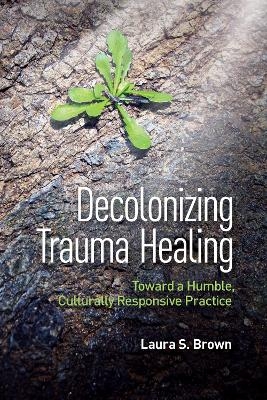
Decolonizing Trauma Healing
American Psychological Association (Verlag)
978-1-4338-4063-0 (ISBN)
This book offers a critical examination of the field of trauma work using a decolonial lens, recentering narratives and approaches to healing in a more inclusive, culturally responsive way than that offered by dominant Eurocentric approaches.
As trauma is a universal experience, a colonized paradigm for responding to trauma re-introduces problematic dynamics of domination and subjugation that are inimical to healing. Decolonizing Trauma Healing offers a new paradigm for how psychologists and other mental health providers can learn to properly understand and work with people whose lives, psyches, and souls have been damaged by exposure to trauma.
Dr. Laura S. Brown introduces her decolonial, humble, culturally responsive (DHCR) model of trauma healing practice. It urges readers to abandon the concept of cultural competence and other approaches that maintain a Eurocentric perspective, in favor of a decolonial method that re-centers the sufferer's lived experience, with an understanding of the subtle ways in which the colonial mindset underlies the causes of trauma as well as our traditional conception of trauma healing. As a member of a colonized and marginalized culture, as well as in her work as a trauma healer, Dr. Brown serves as an inspiration for readers who want to understand why the traditional approach to trauma care has been insufficient, and all those who are ready to do the work needed to bring the field to a new level of clarity and rigor.
Laura S. Brown, PhD, ABPP, has practiced trauma work in Seattle, Washington, living on unceded Duwamish land, since 1976. A speaker and author on decolonial, liberatory, intersectional feminist therapy theory and practice, she offers workshops and trainings to professionals around the world as well as for the general public on such topics as trauma work, self-care for trauma workers, cultural responsivity, and the ethical challenges of this work. She is the past-president of the APA Division of Trauma Psychology.
Acknowledgments
Introduction: We Meet Again
Chapter 1: Introducing the Decolonial, Humble, Culturally Responsive Model
Chapter 2: An Expansive Decolonial Paradigm for Trauma
Chapter 3: Decolonizing Trauma Healing
Chapter 4: Where We’ve Come From: The Heritage of Decolonial Healing
Chapter 5: Decolonial Understandings of the Traumagenic Effects of Social Pathologies
Chapter 6: Exploring Intersectional Identities in DHCR Trauma Healing
Chapter 7: Decolonizing the Constructs and Myths of Safety, Part I
Chapter 8: Decolonizing Myths of Safety, Part II
Chapter 9: Stories of Unknowing and What Follows When We Know: Getting Closer to Safe
Chapter 10: Intersectionalities and Trauma: Risk and Capacities in the Face of Social Pathologies and Relational Harm
Chapter 11: Exploring and Decolonizing the Intersectional Identities of Suffering People
Chapter 12: Criteria for a Decolonial, Humble, Culturally Responsive Practice of Trauma Healing: Making the Grade
Chapter 13: Aren’t There Already Some DHCR Trauma Healing Methodologies? And What Can We Learn from Them?
References
Index
About the Author
| Erscheinungsdatum | 15.11.2024 |
|---|---|
| Verlagsort | Washington DC |
| Sprache | englisch |
| Maße | 152 x 229 mm |
| Themenwelt | Geisteswissenschaften ► Psychologie ► Klinische Psychologie |
| Medizin / Pharmazie ► Medizinische Fachgebiete ► Notfallmedizin | |
| ISBN-10 | 1-4338-4063-4 / 1433840634 |
| ISBN-13 | 978-1-4338-4063-0 / 9781433840630 |
| Zustand | Neuware |
| Haben Sie eine Frage zum Produkt? |
aus dem Bereich


